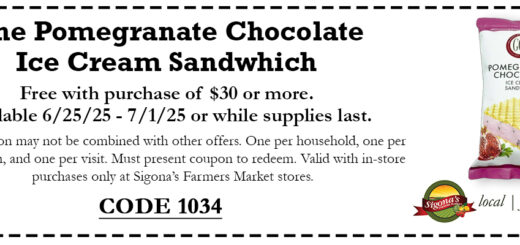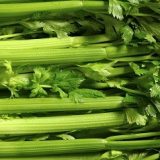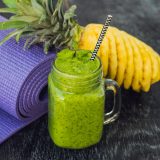Tips for Healthy Living Featuring: Tomatoes!
Tomatoes!
Along with fresh sweet corn and plump peaches, the arrival of heirloom tomatoes is one of the hallmarks of summer. And we’ve got some glorious tomatoes for you this season.
These are the tomatoes you remember eating as a kid – maybe even picking one from your family’s backyard (unless the squirrels got to them first), then eating it right out of your hand, juice running down your chin and through your fingers.
You won’t find them at most major supermarket chains; they simply aren’t grown in the mass quantity required to meet the needs of their customers. You’re more likely to find them at farmer’s markets such as Sigona’s and roadside produce stands in the country. Or if you’re lucky enough, in your own garden.
All about Heirlooms
So just what makes a tomato an heirloom? The general rule of thumb (as there is no certification) is that it comes from a seed that was passed down, season after season, for at least 50 years. And unlike conventionally-grown tomatoes, where consistency of flavor and texture is paramount, and where growth factors are tightly controlled, heirlooms are pollinated by whatever nature brings – be it birds, insects or wind. The result: a genetically more diverse tomato. You could think of an heirloom tomato as an heirloom patchwork quilt, handed down through generations, with each new square adding dimension and texture.
By the way, not all heirlooms are organic. Heirloom refers primarily to the seed; organic refers to how it’s grown. Whether heirloom or not, any tomato is only as good as the soil it’s grown in. If tomatoes are grown in nutrient-poor soil, you will have a beautiful tomato, but not much taste or texture. Simply put: the better the soil, the better the tomato. For this reason, many heirloom growers favor using organic matter such as compost to amend their soil, believing it will enrich the flavor and nutrition of the fruit.
And a word on the drought…
Which brings us to water and our continuing drought. Tomatoes actually fare better with less water. Which seems counterintuitive when we know how juicy they can be. But consider: the more water in a tomato, the plumper it will be. With all that water, the flavor becomes diluted – literally watered down. With less water, tomatoes will pack more flavor and color thanks to more concentrated flavonoids.
Lycopene Power
An average-size tomato is low in calories and fat, yet supplies about 40% of the vitamin C, 20% of the vitamin A, and 10% of the potassium you should get in a day. And lycopene, which puts the red color in tomatoes, acts as a powerful antioxidant: a famous Harvard study found men who ate a tomato-rich diet reduced their risk of prostate cancer by as much as 45%.
The body absorbs lycopene more easily from cooked tomato dishes – two to four times as much. So cook up a double batch of your grandmother’s spaghetti sauce and freeze some to enjoy this coming winter while you enjoy the tomato’s health benefits as much as its summertime flavor.
Or make a nice Caprese salad: sliced tomatoes and a slice of Buffalo mozzarella topped with fresh basil and a few pine nuts, drizzled in Sigona’s Fresh Press Extra Virgin Olive Oil. Grind a bit of coarse salt and black pepper and enjoy. (If you need to avoid dairy, it’s still tasty without; some lactose intolerant people can still enjoy a dollop of chèvre made from goat’s milk instead.)
To store: keep them out and they’ll stay good for up to a week. There’s no need to refrigerate these tomatoes.
We’ve got loads of great tomatoes, both heirloom and conventionally-grown (try the Kumato tomatoes – and don’t be intimidated by their unusual color. They have a flavor profile that offers a wonderful balance of acid and sweet. Come in and taste them, along with our many heirloom varieties – we love sharing our favorites with you!











